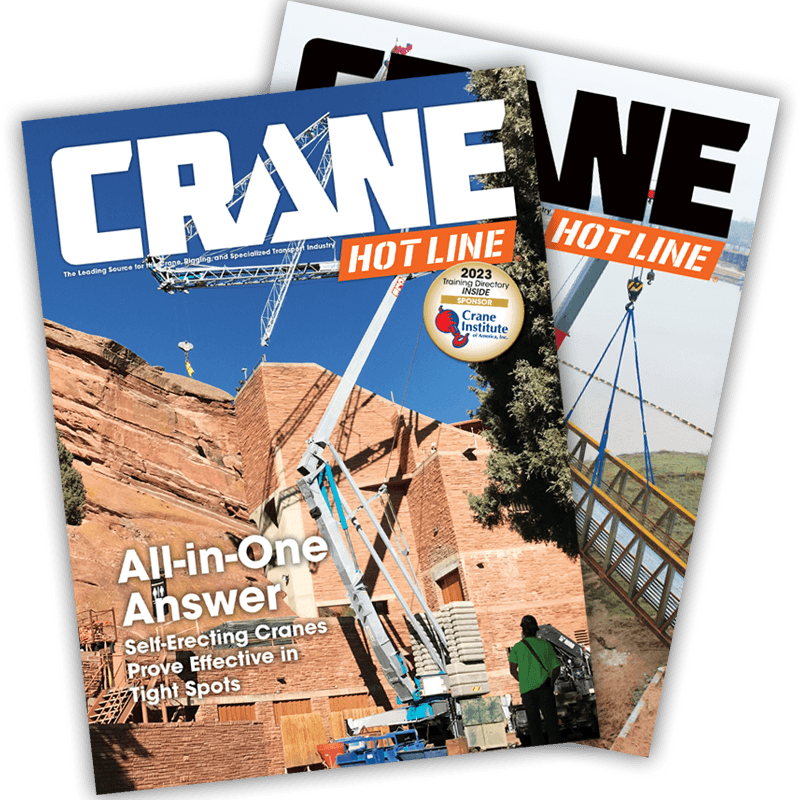Tailor-made for North America (Part 2)
 |
|
Enlarge Image |
October 20, 2004—Pinguely-Haulotte, L'Horme, France already builds one of the most popular 40-foot class articulating boom lifts in the global market, but the straight boom HB-40 and jib-fitted HB-44J are the company's first venture into this mainstream category. Although these units were not built only for North American consumption, there is little doubt that these straight boom lifts are key to Haulotte's success in
To learn more about Haulotte's entry into the North American market and the design philosophy behind the HB-40 and HB-44J, go to Part One:Tailor-made for North America
Service and maintenance
Servicing the HB-40 and HB-44J should be a straightforward affair. Nearly all the service points can be found below the stylish high-swinging fiberglass cowlings. And if you can't reach something, the cowlings are designed to slip on and off the machine for even greater access. The cowlings' steel framework seems to proved adequate support for the fiberglass skin.
Image 2: Swing-up hoods offer exceptional access to all the key components. They can also be removed in a matter of seconds.

Enlarge Image
All internal combustion powered Haulotte lifts utilize a standard central processing unit (CPU) located in the lower control box. Regardless of the type of machine—scissor lift or boom lift—if it is powered by an engine the technician only has to know one part number. This means only one part has to be stocked on the shelf. And more importantly, fleet managers will never receive a call from their road technicians saying they have the wrong part on the truck. In addition, the CPU allows customization of controls and default codes.
Image 3: Few can argue with the service record of the fuel-efficient Deutz air-cooled F3L diesel engine.
The unit I test drove was equipped with a Deutz air-cooled F3L diesel engine. Few can argue with the service record of this engine…saying it is bullet proof might even be an understatement.

Enlarge Image
The engine produces 38 hp at 2400 rpm and turns a single Rexroth variable displacement hydraulic pump, which provides a maximum 22.4 gpm at 4,000 psi. During my field test, I found that this was sufficient flow to allow for multi-function operation. Additionally, four-wheel drive is standard. Over the last several years I have observed Haulotte aerial work platforms working in very demanding rough-terrain conditions, and they have never failed to perform. This is due in part due to the hydraulic differential lock and 14 inches of ground clearance. Note also that foam-filled tires are standard. But it is also due to a very efficient use of power. To satisfy North American buyers' preferences, a 1.6 liter/49 hp dual fuel, water-cooled GM engine is also a popular no-cost option.

Enlarge Image
Image 4: Large hockey puck style wear pads can be easily adjusted from the outside of the boom.
The HB-44J is standard equipped with a 4'11” jib offering 140° range of motion (±70°). The boom assembly utilizes a single hydraulically extended telescopic boom section. Large hockey puck style slide/wear pads are located on the bottom and sides of the boom tubes. The pads can be adjusted from the outside of the boom (see Image 4) and provide excellent tolerances for minimum boom deflection. Location of the pads also makes them easy to inspect and replace if necessary.
Image 5: The external power track is easy to inspect and maintain.
The HB-40 family is Haulotte's first to use an external power track. It features a simple, open design. Open tracks often require more maintenance than enclosed tracks, but they are easier to inspect and service. The good news is that the track links are made of a plastic/nylon composite material, which is easier and cheaper to replace than metal links.

Enlarge Image

Controls and other operator considerations
Primary operation of the machine is commanded by three robust Hall Effect joysticks supplied by ITT Industries. The right joystick is for drive/steer, the left one controls lift/rotate, and the middle joystick provides boom telescope functionality. The joysticks control fully proportional Sauer Danfoss control valves, which are equipped with manual override capabilities.
 |
| Enlarge Image Image 6: Hall Effect joysticks supplied by ITT Industries are protected from damage by a roll bar. |
The proportional control valves are grouped near the lower control box adjacent to the rotation gear box, which is a simple worm-style actuator providing 360° continuous rotation. Although this is an adequate design choice, the worm gear is not as substantial as a more commonly used planetary drive. During operation, I discerned very little play in the superstructure's swing, but time will tell whether it maintains its initial positive feel.
Image 7: A carefully positioned flange should prevent cross contamination of the adjacent filler spots.
I may seem overly cautious, but inadvertent contamination of the hydraulic system that can occur if someone mistakes the oil fill point with the fuel filler is a disaster. Notice that Haulotte has grouped these two filler spots together, which is usually a no-no, but the addition of the flange that is bolted in place should prevent fill mistakes from happening.

Enlarge Image
My test unit was equipped with a spacious optional 8-foot wide platform, featuring obligatory 180° rotation. Although rotation is not proportional, the operator can customize rotation speed by adjusting the manual flow valves located between the tip of the boom and the platform mount.

Performance
Compared with other higher output engines (up to 84 hp) available on the market, this 38 hp rating may seem a little light for HB-40's 13,227-pound gvw and the HB-44J's 15,430-pound gvw. But it really works just fine. The Deutz F3L diesel engine is not an over-built, fuel guzzling monster. It delivers just the right amount of power to get the job done. As fuel prices continue to get higher, fuel efficiency is something we should all be concerned with.
I found the proportional drive controls too sensitive for my taste, although they were smooth. After exploring the problem with Alan Dotts, general manager for Haulotte
The HB-40 and HB-44J features three drive ranges, one of which is a differential lock mode for maximum traction. In this mode, the unit's hydraulic drive is taken from a series to a series parallel hydraulic flow configuration. Changing drive modes requires that the machine come to a complete stop before the operator can shift from one range to another. Haulotte feels this is a safety feature to prevent the operator from accidentally bumping the range selector switch. Doing so would produce a pronounced deceleration.

Pricing
The basic diesel-powered HB-40 is $79,900, which includes standard 31”X70” platform, four-wheel drive, and foam-filled tires. Note the optional 8-foot wide platform is available for $450. A similarly-equipped HB-44J is $86,500. The cost goes down a little when equipped with the dual fuel engine: $79,400 for the HB-40 and the HB-44J runs $86,000. Remember, these are list prices and Haulotte is positioned to aggressively market these models.

Likes
- Across-the-board interchangeability of the CPU simplifies parts stock and replacement.
- The units are designed for straightforward service.
- The Deutz diesel engine is fuel-efficient, providing adequate power for the job.
- Haulotte's first-ever external power track is well-conceived and executed.
Dislikes
- Worm style slewing actuator is behind the times.
- Touchy controls require optimization to perform with more precision.
Verdict
Haulotte delivers a couple of mainstream straight boom lifts that seem to adhere to the company's philosophy of being robust, reliable, and easy-to-maintain. Plus, I hear that the pricing is unbeatable.


